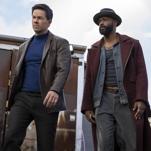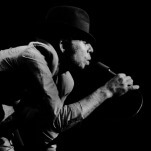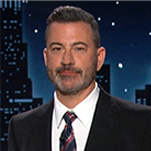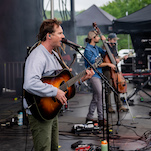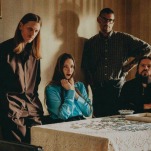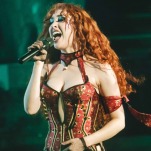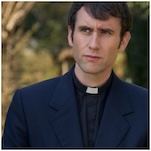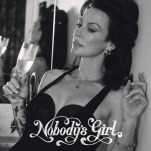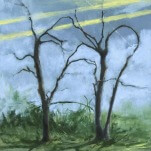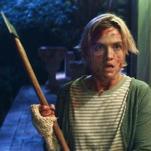Cress Williams Talks Family, Supersuits and Competing Powers as Black Lightning’s Second Season Lights Up
Photo: Quantrell D. Colbert/The CW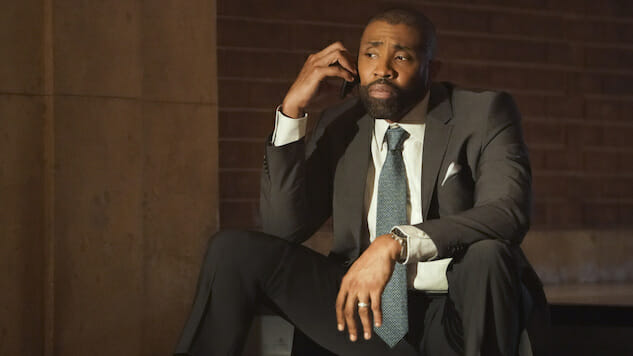
It is no secret that we here at Paste love Black Lightning, The CW’s first superhero show not only to exist outside of the Arrowverse, but also to feature a black superhero, his superheroic family, and a world whose evils and prejudices are consistently, distressingly familiar. What might be a secret, though, is that we love star Cress Williams just as much.
With the second season of Black Lightning hitting American small screens on Tuesday, Williams, who has been a regular fixture on American television screens since his days as D’Shawn Hardell on Beverly Hills, 90210, was generous enough to chat with us about his characters’ (yes, plural!) evolutions, the spirit of collaboration cultivated by series creators Salim Akil and Mara Brock Akil, and how he is the biggest fan of Jefferson Pierce around. And while Williams has plenty of praise for both Jefferson and Black Lightning, and appreciation for the Akils and what they are doing with the show vis à vis the real world, we made sure to end, as is only right in this cultural moment, where Season Two begins: On the awesome power and potential of teenage girls.
Editor’s note: The following interview contains has been edited for length and clarity.
Paste: When the first season premiered, part of the “gimmick” was that Black Lightning was a superhero who was not just older, but who had been at it for a long time, which meant the audience was coming in at a kind of narrative disadvantage. This season, we are more or less caught up to where he is in his journey. Has that change played into the storytelling?
Williams: When we started, Black Lightning wasn’t a superhero that people [were going to] recognize. He’s not a Superman, a Batman, one of these iconic heroes, so we had to really establish this world, get the audience members who have never even heard of him acclimated. What is great in Season Two is that everybody knows [him] now, there’s a shorthand now, now we can really go deeper into all the things that make this show unique. Like, so many superheroes have no earthly ties, or they work hard to not have any earthly ties, but here’s a superhero who has an entire family, he’s got multiple earthly ties. We get to go into that more deeply, that he’s trying to be a superhero, he’s trying to do these things in Freeland and in the community, but he also has all the kinds of drama that anybody with a family understands. We get to go deeper into the dynamics of a father and a daughter who is basically an adult but is still living under [his] roof, and we get to go deeper into the dynamics between a father and a teenage daughter. And we have some great things for Lynn [Christine Adams] this season, even though she doesn’t have superpowers, per se—she really gets to get in there and use her superpower, which is her brain.
Paste: How has your relationship with Jefferson and/or Black Lightning changed as you’ve moved through a full season, and as the real-world culture has moved (or not moved) along outside of it?
Williams: I think it’s grown, specifically if I separate them out, as Jefferson and as Black Lightning. When I first sought out this role, I was just kind of this nerd who wanted to play a superhero, so I was really just drawn to like, “Oh, it’s Black Lightning!” Even though I didn’t know Black Lightning, I knew he was a superhero, and I had always wanted to do that. And then as I started really digging deep into it and filming, I just became enamored with Jefferson Pierce, and that’s only grown going into the second season. I just love Jefferson Pierce, and when I’m out in the world and encountering fans, especially little kids, I am just extremely [happy] because I know that Jefferson Pierce is a role model that I can be proud of. This is a guy who stands for family, he stands for education, he stands for helping his community, you know, all these positive attributes. So when somebody recognizes me, and they look up to this character, or look up to me, I can accept that wholeheartedly, and not go, “Hey, yeah, but don’t do what this character does.” Like, yes: Stay in school! Do what this character does!
Now, on the flip side, doing Black Lightning—and this is just from an acting standpoint—the suit is really really uncomfortable and hard to wear, so that [enthusiasm] has been kind of wearing down a bit. [Laughs]
Paste: Back at the show’s launch event, DC in D.C., you had such excitement about putting the suit on for the first time. Sounds like the novelty has worn off!
Williams: The thing is that it was my first time stepping into this world altogether, so I’ve learned a few things! The thing is, you start off with a two-dimensional image and you’re like, “Wow, that looks cool,” but it’s just a two-dimensional image. Then you go through the process of getting fitted, and they create the suit, and when you put it on, you only have it on for maybe thirty minutes, so you don’t really get a sense of what it’s really going to be like on set, when you’re in it for six to eight hours at a time, on multiple days. It’s not until you really start putting it through its paces that you’re like, “Oh, that really makes me shoulder hurt! Oh, this is really heavy! Oh, I’m sweating like a pig!” [Laughs] Moving forward, I know those things, so when I look at two-dimensional images as we start going through the process of creating [upgrades], I can ask, what is that made of? And can I see what that feels like? And can it breathe? But I do admit that the suit looks great on camera!
Paste: What are some upgrades you would want to add to the suit, both from a storytelling standpoint, and just as you, Cress, the actor?
Williams: Salim always wanted there to be an evolution in terms of character and in terms of power and abilities, so last year we did [update the suit] in the sense of incorporating the shield, and the 10-point accuracy, and flight, but in this second season we’re also unveiling some new things that I’m not allowed to [reveal]. But for me, the character of Black Lightning is a hands-on fighter. He has the ability to electrocute people, but he gets down and does a lot of hand-to-hand combat. So what I’d like to see in the future is a suit that’s flexible, that is a lot more breathable—we have a lot of hard pieces [now] that [make the suit] reminiscent of Iron Man, and I’d like to see it evolve more into a Black Panther-type of thing, because he is more hand-to-hand. So I’d like it to be more flexible, more breathable, and, really, just more understated. Because [Jefferson] is a metahuman, he has these powers whether he has the suit or not. I’d like something that speaks to that.
Paste: You’ve spoken elsewhere about how important specificity is in your personal acting craft. How has the idea informed your work on Black Lightning?
Williams: What’s great about acting is that there’s never a moment when you’re like, “OK, I got this, I understand this.” You’re portraying life, and it’s a craft that only gets better with time—kind of like playing a musical instrument, the more you get to play it, the better you are. So what’s really been awesome, from an acting standpoint, is just having a job to go to every day, a place where I get to play and practice and do every single day. The more that you do that, the more those foundational things that you used to have think about are things that just happen instinctually. Kind of like a musician who’s playing scales, the more you play the scales, the next thing you know, you’re not even thinking about the notes, your body’s just doing that. So a lot of that is happening, and I get to go to another level that’s more specific.
Paste: Is there anything interesting you’ve discovered about either of your two characters as you’ve spent more time with them?
Williams: Yeah, I think [Jefferson] can at times be really rigid, in the sense that—we see, especially at the beginning of the second season, we jump in about a week after everything that’s happened since the [Season One] finale, and we discover that everybody else in the family understands that things have changed, that life as they knew it in the first season, we can’t go back—that there’s a new normal. And I think Jefferson is so rigid that he’s the last one to discover that, that he kind of proceeds like, “OK, we just pick up where we left off, we just get up and go to work the next day.” And he comes to this rude awakening over time that, “Wait a minute, everything’s not alright and things have changed.”
Paste: The Season Two premiere deals with a lot of those changes, but one of the biggest is actually at the high school, where Jefferson has been—at least until it was nearly destroyed at the end of last season—the beloved principal. That looks like it’s going to change this year.
Williams: [Initially,] I didn’t even think about it, I lost sight of the fact that there was an attack on the school. Sure, Black Lightning saved it and everything was groovy, but Jefferson never showed up. And it wasn’t until I started reading the scripts that I was like, “Oh, right.”
Paste: A weakness of many comic book stories, not remembering how real-world infrastructure will be affected after superhero shenanigans.
Williams: Right! I love that we bring the real world back. And the fact that in the story, Jefferson is the last one to realize that, “Wait a minute, there are repercussions from Season One that are going to change everything.” I think in the family, the last one to realize that there are repercussions, it’s him. He just wants to go back to going to school, having a job, eating family dinner, and oh, maybe I’ll fight crime every now and then, but no! There are consequences!
Paste: What, for you, has been the most compelling storyline or arc for you thus far, in either season? No spoilers, but the call-and-response scene at the high school in this season’s second episode is particularly moving, especially for how earned it was through all the work Jefferson put in as principal in the first season.
Williams: I love all things family, and when I think of one aspect of the family, I think of working with China [Anne McClain], and the whole Jennifer learning her powers/having a teenage daughter thing—there’s aspects of that that I really dig. But then also in Season Two, at least as we start, Lynn and Jefferson are doing really well as a couple. Even though they are divorced, they are kind of living life and parenting like they’re married, and so we get to play with that. For me, family is first, so from an acting standpoint, I can tap into my own marriage, I can tap into how I feel about my own kids. And as a black man, I love portraying a man who is actively in his family. I love portraying a loving, together family unit, and to do that in the midst of [how] society [is]. You know, when I’m not playing Jefferson, I have my own family dynamic of my teenage daughter, and my young ones, and just trying to do things like get to the grocery store and all these [normal] things… in the midst of all the things going on in this world, having to maneuver through all of that. And that’s what our show does. Like, here’s this family, and they’re trying to survive, they’re trying to grow, they’re trying to work through their family issues, but also the world outside around them doesn’t stop, it’s still going. And I love playing that. Jefferson is dealing with the family, and Black Lightning is dealing with the world, and I love getting the chance to play with both.
Paste: The acting and the storytelling are such critical aspects of this show, of course, but one of the things that makes Black Lightning so powerful is the care the Akils put into post-production, especially the soundtrack. Do you ever get to have your hand in that?
Williams: I watch it every single week, so anything that I can be surprised by, that makes it even more compelling to watch, and the music is a big part of it. I try not to think about it, then I can watch it and go, “Wow, that’s awesome.” Special effects are another thing [like that], we do the scenes, and then I get to see the special effects afterwards to go like, “Oh, that’s how it looks!” So those are the little surprises I like to look forward to.
Paste: What’s an effect or sequence that you were amazed they pulled off on a small screen?
Williams: Not so much that I didn’t think they were going to work, because I believe that they’re all going to look good, but I believe Season One, at the very end, the moment when Jennifer comes and hugs me and charges me up at the end, that looked bigger than in my mind [I had anticipated]. I was like, “Whoa! That’s a lot of power!” It really looked more spectacular and bigger than I had pictured. It helped me understand her power.
Paste: Her power is visually awesome, especially this season.
Williams: Yeah, I mean, I’ve got to admit, I’m a little jealous! I kind of don’t want to admit to the fact that she’s as powerful as she is. That’s true to the comic book, but as Jefferson, and with my competitive nature, I almost don’t want to admit that, “Gosh, she’s so powerful!”
Season Two of Black Lightning premieres Tuesday, Oct. 9 at 8 p.m. on The CW.
Alexis Gunderson is a TV critic whose writing has appeared on Forever Young Adult, Screener, and Birth.Movies.Death. She’ll go ten rounds fighting for teens and intelligently executed genre fare to be taken seriously by pop culture. She can be found @AlexisKG.





